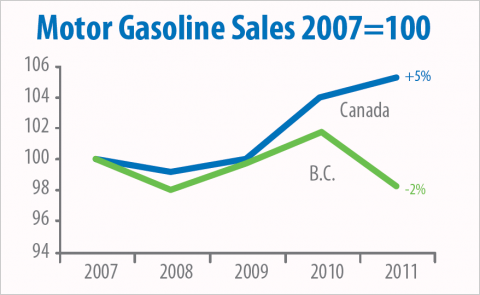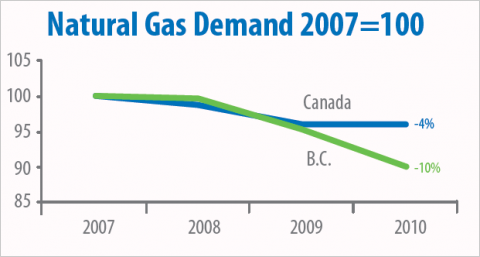All too often in the world of climate policy we’re confronted by a lack of progress, so it’s encouraging when there is some positive news to report. A trio of reports from B.C. this week all pointed to some initial success emerging from the province’s Climate Action Plan — an initial success that we hope will kick start a "What’s next?" conversation in the province.
The most important sign of success is that B.C.’s climate policies appear to be reducing emissions. That’s the main message from a report released Wednesday by the B.C. government, Making Progress on B.C.’s Climate Action Plan. The province’s Greenhouse Gas Reduction Targets Act requires the province to produce a report every two years assessing its progress towards its climate change objectives. Based on the most recent data available, B.C.’s greenhouse gas emissions dropped by 4.5 per cent overall between 2007 and 2010.
And emissions aren’t the only factor on the decline. A series of charts comparing fossil fuel consumption in B.C. to the national average (see below) shows B.C.’s consumption of each type of fuel declining — in absolute terms and relative to the rest of the country. This trend strongly suggests that B.C.’s climate policies are contributing toward the drop in emissions by affecting fossil fuel consumption, rather than simply attributing the drop in emissions to the economic downturn.


Note: The natural gas chart (above) does not include consumption by natural gas producers or natural gas used for electricity generation. See p.10-11 in the B.C. government report, Making Progress on B.C.’s Climate Action Plan, for charts and information on the use of other types of fossil fuels.
There are a couple of important caveats to note about the province’s climate progress report:
- It only represents the results of three to four years of data, so time will tell if these positive signs solidify as longer-term trends.
- The natural gas consumption statistics on page 10 don’t include the significant volumes of natural gas used to extract and process more of the same fuel. These ‘upstream’ emissions are particularly important in B.C. because, as the province’s report notes, growing emissions from the natural gas sector are one of the major challenges standing between B.C. and its climate goals.
The province’s report wasn’t the only piece of positive news this week. In conjunction with the Energy and Materials Research Group at Simon Fraser University, the Pembina Institute released a report that presents various perspectives about the effectiveness of the carbon tax to date and how it could be improved. The research found that, among representatives from B.C. businesses, non-government organizations, academics and community leaders, a strong majority (64%) said that the carbon tax has had positive consequences for the province, while only a small minority (18%) believed the policy to have had negative consequences so far. Another new report released this week by Sustainable Prosperity concluded that B.C.’s carbon tax seems to have had a positive environmental impact without harming the economy.
Given that B.C.’s first steps on climate change seem to be yielding results, you’d think the government would be keen to build upon that initial success and start laying out the next steps in its Climate Action Plan. The province’s report acknowledges that stronger policy is needed if we’re going to continue making progress, but offers British Columbians little insight into what that stronger policy could look like. As a result, there’s a general sense that the province has stalled on next steps, and may even be sliding backwards in some areas — as demonstrated last week when the Premier redefined “clean” energy to include natural gas-fired electricity, as long as it is used to liquefy natural gas that the province wants to export to Asia.
Thankfully, there is no shortage of ideas of what those next steps could look like — just a shortage of conversation and action. If we take B.C.’s carbon tax as an example, there are some relatively easy ways it could be improved, such as eliminating a loophole that gives the natural gas sector a partial free pass on the tax and improving the protections provided to low-income British Columbians. After that, the bigger conversation for B.C. is deciding by how much it should increase the tax in 2013 and beyond, and what the revenue should be used for.
Talking about those next steps isn’t always easy, but it is absolutely essential if we’re to have any hope of preventing the worst impacts of climate change. Failing to have that conversation in substantive terms is turning a blind eye to the huge risks climate change poses to B.C.’s environment and economy, and failing our kids and grandchildren. Just one example of those risks was highlighted yesterday in study from Stephen Déry at the University of Northern B.C., cautioning that a warming climate in B.C. will lead to greater variability in river flows — which, in turn, will negatively impact salmon returns, water quality and the safety of residents in affected areas.
The fact that B.C. is seeing some positive signs on its climate change objectives is hugely encouraging. This initial progress ought to launch the next steps that will be needed to make sure this year’s progress report is the start of an ongoing trend, and not just a blip on the radar.







